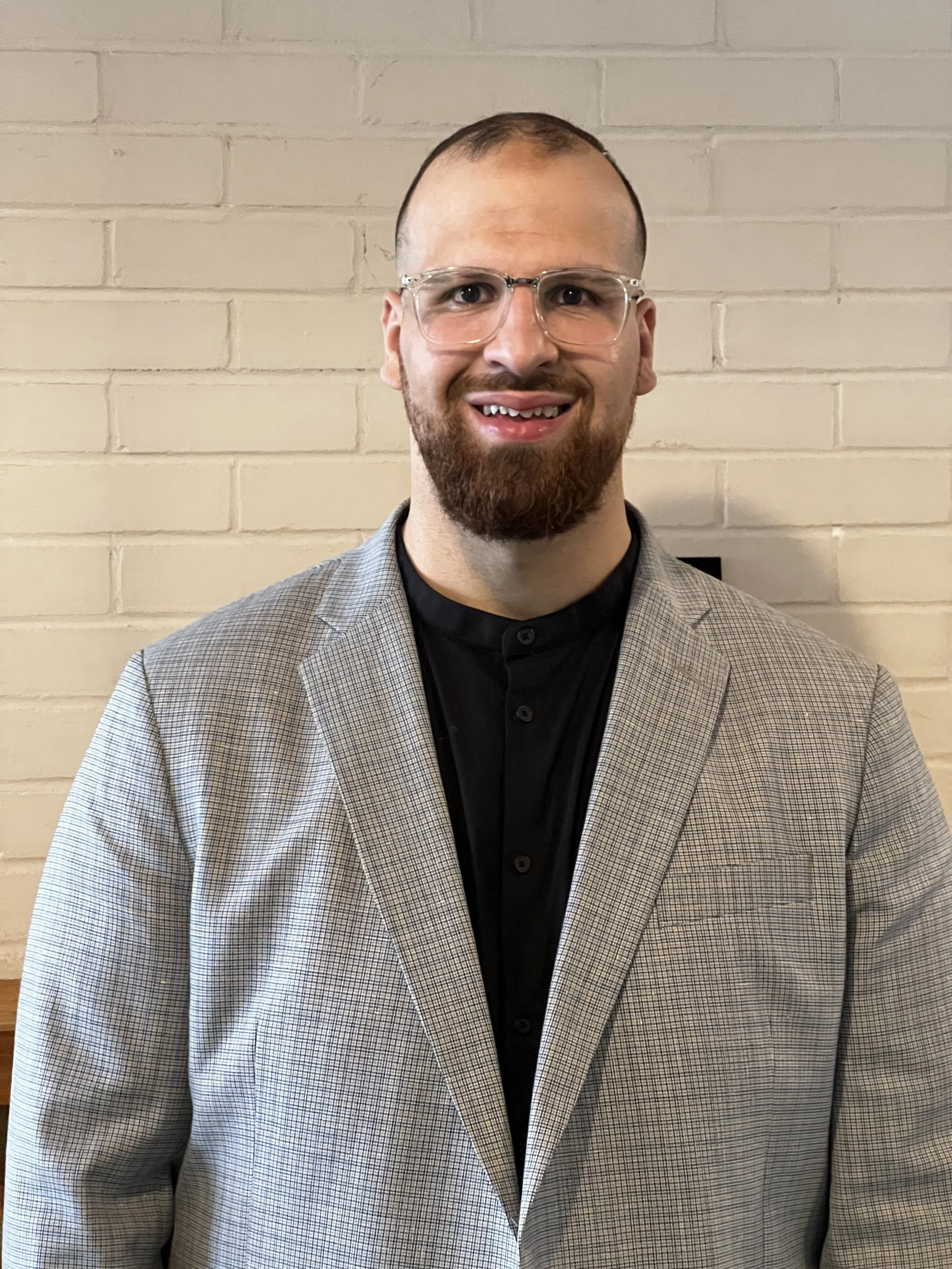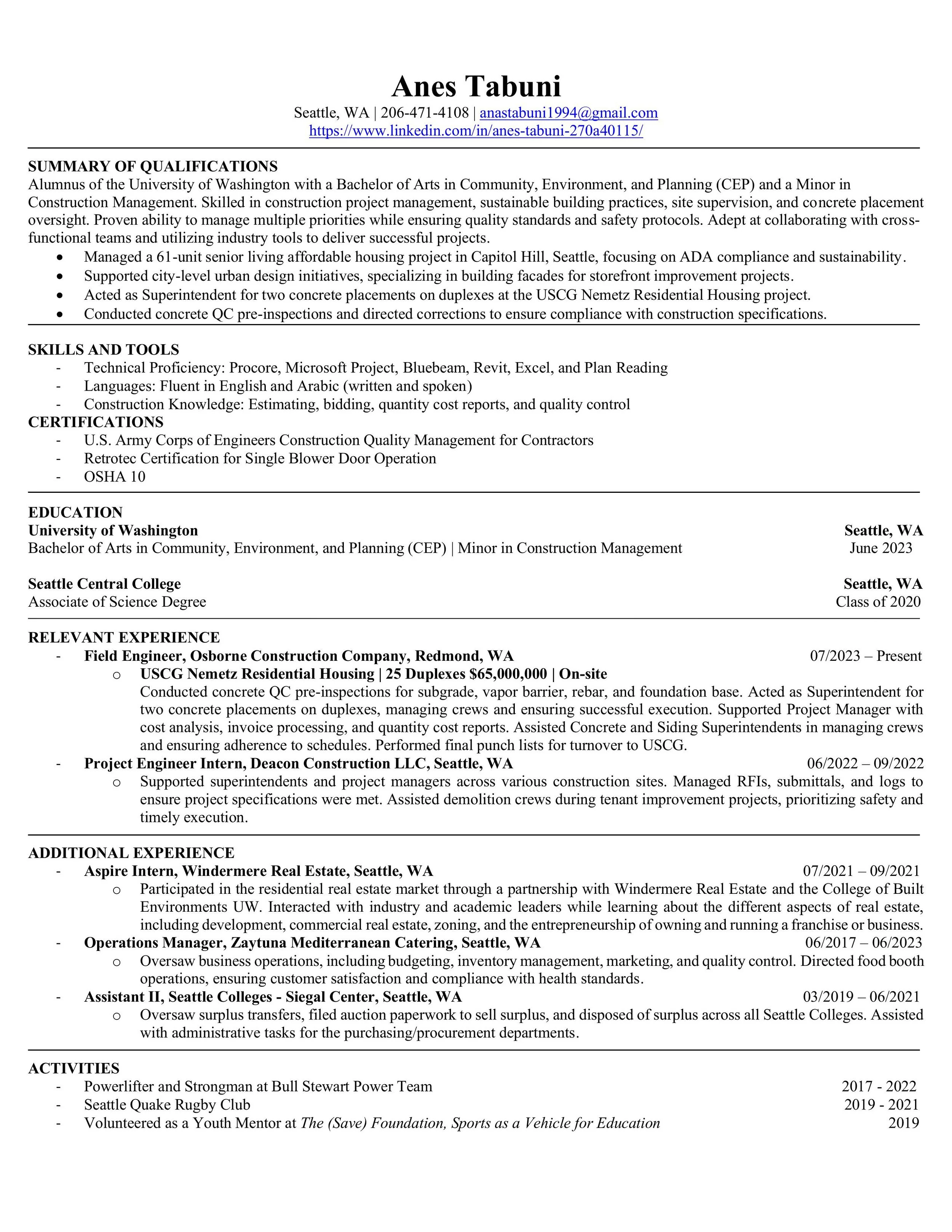About me
Hi, my name is Anes Tabuni, and I graduated from the University of Washington with a Bachelor of Arts in Community, Environment, and Planning (CEP) and a minor in Construction Management. I am eager to take on leadership roles in the community, to educate myself in becoming an active steward for the environment, and to engage in mindful planning to implement positive change. In my free time I enjoy backpacking (and other outdoor activities), playing rugby, and working out. I also have a passion for photography. I love capturing how the built environments interacts with our surroundings and natural world. Through these activities I have learned how to be strong-willed and a team player.
Anes Tabuni
Personal Statement for CEP major
University of Washington
February 15, 2021
I never realized how the trauma of escaping my war-torn home country of Libya would correlate to the challenges I faced integrating into the American higher education system. The struggle of my identity - a dual citizen, American-born, Libyan-raised war refugee - along with cultural and socioeconomic obstacles were all things that set me against a manageable path to success. However, through years of hard work dismantling my trauma and finding the right support system, I stand here now, an associate’s degree graduate ready to take on the next step in my educational journey.
On February 15, 2011, protests erupted in Benghazi, Libya. I was only sixteen, living in my parent’s hometown of Tripoli. Gaddafi’s grandson attended the same international school as my brothers and I; it was a common occurrence to see armed bodyguards every day on campus. Three days after the Benghazi protests, my father was detained for being an outspoken opposer to Gaddafi. There were kidnappings, shootouts, and killings every day. My older brother Omar and I knew we had to escape, but my mother refused to leave without our father. By April 2011 we didn’t know if my father was dead or alive, but there was no time to lose as the last rescue ship was coming and we had to board it. My brother and I took only our American passports, a couple changes of clothes, and $1000. It took the support of the community members around us to make the journey to our next stop - Monterey, California.
My brother and I lived with our sister and brother in law in their one bedroom apartment for the next six months. High school in Monterey was a huge adjustment after war-torn Libya. I was quickly recruited to play football and while it gave me a sense of community in California, all of my relationships felt surface level; nobody truly understood where I had come from.
In August of 2011, my father escaped from prison a week before all detainees were set to be executed and by October 2011, the revolution in Libya was officially over. The very next day, my brother and I returned to Tripoli to be reunited with our family. Militia fights were still happening regularly on the streets; these types of shootouts were tragically common and I was strangely accustomed to the thunderous gunfire. Yet even during this chaotic time, I was motivated to bring about positive change in my environment and community. Therefore, in May 2012 I volunteered with Cleanup Tripoli, a program designed to combat garbage pileup and introduce recycling and composting to the city. It was unsettling to see the lack of proper waste management, but being involved with change brought me joy. During the cleanup sessions, people of all demographics participated to create a healthier environment. This process not only benefited the environment but it ended up mending the community as well.
Around the same time, I was hired to teach English conversation and grammar classes to adult government employees. Teaching at a young age taught me the importance of adaptability and flexibility; oftentimes concepts need different approaches to learn in one’s second language. It was also important for me to create a comfortable learning environment for active participation and safe learning. This experience gave me insight to how effective leadership can produce a flourishing community.
In 2014 the second civil war broke out and this time it was led by General Haftar’s militia and allies that controlled my neighborhood and all surrounding areas up to the airport. The airport was levelled to the ground and I was yet again looking to escape the country as a war refugee. I managed to leave and join my older brother in Seattle. We had very little money and were separated from the rest of our family.
I then started Seattle Central College (SCC) almost immediately after I arrived in 2014, which in hindsight I realize was a mistake. I was not set up for success nor was I ready to pursue an education at that time. Traumatic experiences had affected me; I suppressed a lot from my past and was simultaneously adjusting to a new environment. I was working part time, and had just escaped the second civil war in my lifetime. I didn’t have the slightest idea of educational or career goals and because of the lack of support, I failed both of my classes, resulting in the loss of my financial aid package. I thought this was the end of my educational journey.
By fall 2017, my whole family had been reunited for just over a year in Seattle. I had given myself the time and grace to recognize the trauma in my life and turn this into a big motivator. I have always had a passion to help people and I knew I wanted to turn this passion into a career. Lori Miller, the guidance counselor at SCC, was integral in this process. I had anxiety about returning to school and she laid out the best pathway for me to succeed. This time, I decided to use all the resources possible: tutors, advisors, and counselors. This started the upward trajectory in my academic career, beginning with a 1.7 GPA and earning my associate’s degree with a 3.0. It is important to acknowledge that my personal success is a reflection of the strength of my community.
I am committed to continuing my education through a bachelor’s degree from the University of Washington, specifically through the Community, Environment, & Planning (CEP) program. I want to be around like-minded, motivated students and professors who share my passion for community, and to use my life experiences to educate people about climate change and the environment. My ultimate goal is to work in Libya and other developing countries, to support local communities by environmental education and programs, and to teach about composting, recycling, renewable energy, and desert reforestation. The CEP program teaches students “how to be effective leaders and doers of the world.” What draws me to the program is the ability to shape and develop my own path that is specific to my passions and ideas. I am eager to take on leadership roles in the community, to educate myself in becoming an active steward for the environment, and to engage in mindful planning to implement positive change. By pursuing an undergraduate degree in CEP, I believe that I can merge my passions of helping people and helping the environment by creating space for communal participation and communal growth. I want to be involved in projects that have a long term trickling effect that benefit everyone and everything involved.
The academic support programs, such as CLUE Tutoring and Academic Success Coaching, in addition to the Counseling and Odegaard Writing Centers are all resources I plan to use in order to succeed as a CEP community member. The thought of graduating from the University of Washington seemed unattainable when I first moved to Seattle. A bachelor's degree will empower me in sharing my knowledge with others. There is an Arabic proverb by Imam Ali (AD 599-661) that inspires me. He said, "Knowledge is power"; I believe that an education will give me the power to build myself a successful future. I am ready to add to my identity: Anes Tabuni, Libyan-American, war refugee, University of Washington graduate.
Resume

